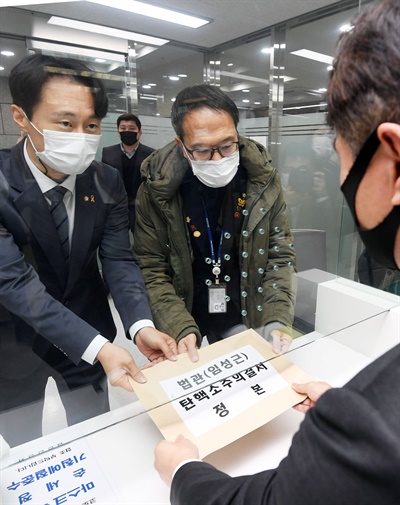The first trial for impeachment of the Constitutional Constitution of Busan High Court Chief Judge Seong-geun Lim, who was prosecuted for the first time in the history of constitutional affairs, has been postponed since the resignation of Judge Lim.
The Constitutional Court announced on the 24th that it will postpone the date of preparation for pleadings for the impeachment trial of Judge Lim, scheduled for the 26th. The revised schedule has not yet come out.
Judge Lim’s term of office is 28 days, so no matter how fast the constitution schedules a trial, it is impossible within the term.
As Judge Lim was judged for impeachment after retirement, the possibility of’dismissal’ of’dismissal’ increased. Let’s find out why this happened.
A bill for impeachment prosecution delivered late because the location was not identified
|
View larger picture |
|
| ▲ Democratic Party Rep. Park Ju-min (right) and Lee Tan-hee, along with the National Assembly Legislative and Judicial Committee, are submitting the original copy of the resolution on the impeachment of Judge Im Seong-geun at the annex of the Constitutional Court in Jae-dong, Jongno-gu, Seoul on the afternoon of the 4th. | |
| Ⓒ Yonhap News |
See related photos |
The first reason Judge Lim’s constitutional trial was delayed is that the impeachment bill was served late.
It was on February 4th that the judiciary committees of the National Assembly submitted a resolution for impeachment of impeachment to the constitution, and on the 16th, the request for impeachment was received.
In the case of former President Park Geun-hye, it proceeded so quickly that the constitution sent an invoice the same day the resolution was received, but in the case of Judge Im, it took almost two weeks.
<세계일보> According to reports, the Constitutional Court tried to serve the bill several times, but the Chief Judge Lim cut off contact with the surrounding area and went down to the province, so there was no way to properly convey it by identifying the location.
It is difficult to understand from common sense that the first lawsuit for impeachment prosecution was served late in the constitutional history because the incumbent chief judge could not be located.
Suspension of litigation proceedings due to a request to evade a judge
On the 23rd, three days before the first trial of the impeachment trial, Judge Lim’s side applied for an evasion against Judge Lee Seok-tae, who served as the head judge for the impeachment trial.
This is why it is difficult to expect fair judgment because Judge Lee Seok-tae has a history as chairman of the Sewol Special Investigation Committee and chairman of a lawyer’s meeting for a democratic society.
The reason for the impeachment of Deputy Chief Judge Lim was Tatsuya Kato, who was tried on charges of defamation after reporting the actions of former President Park Geun-hye on the day of the Sewol ferry disaster. <산케이신문> There is a suspicion of intervening in the trial of the Seoul Bureau chief.
There are also charges of instructing the correction of the reasons for sentencing and some deletions at the time of the trial for a democratic society.
According to Article 24, Paragraph 3 of the Constitutional Court Act, the parties in the case can file an appeal against the judge if it is difficult to expect an impartial judgment, and Article 48 of the Civil Procedure Act requires that the lawsuit process be suspended when an application for dismissal or challenge is received.
The reason why the Constitutional Court delayed the trial can be attributed to the prolonged trial to evade judges.
The trial itself is not over if Judge Lim is impeached after retirement. If the Constitution determines whether it is unconstitutional or not that a judge was involved in the trial, it can give a warning message to the judiciary.
Correcting the constitutional order should continue regardless of whether the judge leaves office or not.

